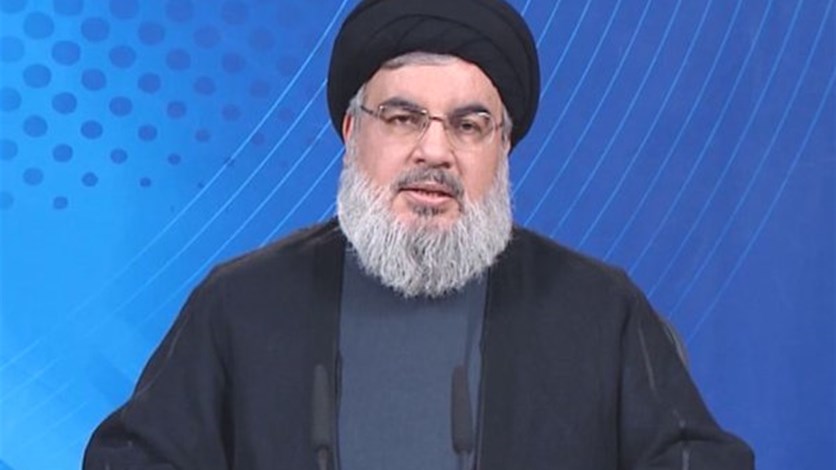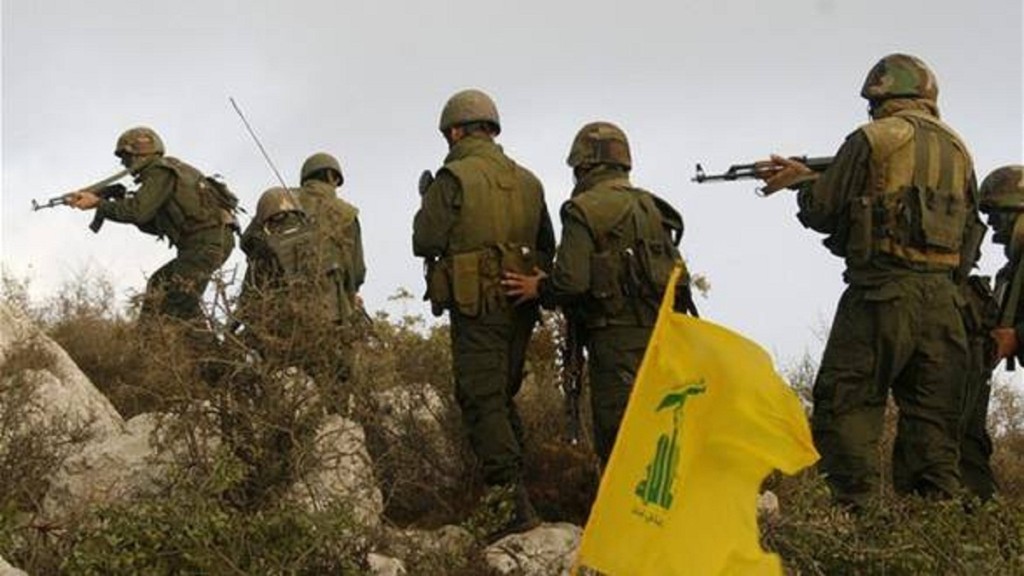PHOTO: Hezbollah leader Hassan Nasrallah in a TV address last Saturday
Late August 2015: the setting is a front line in Zabadani, a rebel-held town in Damascus Province near Syria’s border with Lebanon. With Iranian and Turkish mediators negotiating a temporary ceasefire and the weapons silenced for a moment, Hezbollah fighters have a conversation with rebels across the road.
One Hezbollah fighter is upset about the ruling parties, saying that the ones with power do not care about the people on the battlefield paying the price for their decisions. He is furious and fusses about the situation, noting that even in his mosque things are going badly.
Then he shouts, referring to Saudi Arabia, Qatar and Turkey: “We are enemies, right? But think, who profits? From whom do you get all your weapons? You don’t serve yourself or the law, but those who feed and arm you.”
The rebel fighter asks “What about Assad?!“ and the Hezbollah fighter — upset about the in-fighting of Muslims — answers, “Yes, okay, the Assad system is fucked up as well. But at least Assad always confronted Israel! Our enemy is Israel, that is what we have in common“.
The filmed conversation illustrates the conflict over legitimacy that Lebanon’s Hezbollah faces. Deeply engaged in the 56-month Syrian conflict, Hezbollah’s identity as a resistance movement against Israel is in transition and in danger at the same time. With the increasing death toll among its fighters and the spillover of the conflict into Lebanon, the Shia militia is confronted with domestic opposition, sometimes spurred by Shia Muslims.
To counter that development, Hezbollah’s leadership tries to frame its engagement in Syria as part of the greater fight against Israel, Zionism, and US imperialism, as the Assad regime defines the conflict as a war against Islamist terrorists. But the balancing act is difficult, since Hezbollah is mainly fighting a Syrian opposition that cannot generally be labelled as terrorists.
Now, since Russia’s military intervention and airstrikes from September 30, Hezbollah is an ally of a non-Arab external power with a history of brutality against Muslims. That alliance undermines Hezbollah’s image as an agent of Arab resistance. It may lead to significant opposition in Lebanon to Hezbollah’s de facto status as a state-in-the-state and also to hostile relations with its neighbor Syria in the long-term.
Hezbollah fighters in southwestern Syria
Hezbollah Defines the Fight
Hassan Nasrallah, Hezbollah’s General Secretary, first addressed the Syrian conflict in May 2011 with a speech framing the uprising as a US-Israeli backed plot against Syria’s resistance politics. That statement stood in contrast to his comments on the uprisings in Tunisia, Libya, and Egypt, where Nasrallah publicly supported the uprisings as revolutions of the Arab people.
Commemorating the Martyrs of the Resistance in February 2012, Nasrallah declared Israel responsible for the rise of jihadi groups and accused those backing the Syrian opposition, namely Saudi Arabia and Qatar, of not confronting Israeli hegemony. He said the Assad regime was open to implementation of reforms and denounced the Syrian opposition: “All it wants to do is bring down the regime, so this is a problem.“
Nasrallah bolstered his remarks in late 2012 with the portrait of the regime as one of the last remaining centers of resistance facing an armed insurgency, while the opposition was refusing any dialogue for a political resolution. Then, in May 2013, he acknowledged Hezbollah’s military intervention in the fight for the town of Qusayr, near the Syrian-Lebanese border: “If Syria falls into the hand of America, Israel, and takfiris, the resistance will be besieged and Israel will enter Lebanon and impose its will.”
Nasrallah has since maintained that notion of threat, with horrific scenarios of Takfiri terrorists entering Lebanon after they overran Syria and Iraq. In a televised speech in May 2015 he asked, “If Takfiri terrorism wins in Syria, we will all come to an end. Don’t you see what’s happening in Aleppo, Idlib, Raqqa, Deir Ez-Zor, in Falluja and Anbar?”
Equating the Syrian opposition and rebels with the “Takfiris”, he continued:
The resistance is fighting an existential battle par excellence. Had we not fought in Aleppo, Homs and Damascus, we would have fought in Baalbek, Hermel, al-Ghazieh, Sidon, Tyre, Nabatieh, and other Lebanese villages, towns and cities.
Nasrallah still adhered to the narrative of confronting Israel when he said that the liberation of Jerusalem is directly connected to success in Syria. However, this aim appeared strained, pushed into the background as Hezbollah fought the Muslims of the Syrian opposition and not the Islamic State.
Hezbollah’s leadership has tried to escape the dilemma by following the Assad regime’s narrative of a fight against terrorism. In the short term, the organization has been able to prevent the military collapse of the regime. But in the long term, it is impossible to deny the legitimacy of hundreds of thousands of Syrians by labeling them as Takfiris. Whatever the outcome of the Syrian war, many in Syria with its Sunni Muslim majority will consider Hezbollah as a hostile occupying power.
That problem has been compounded with Russia’s entry into the war as a combatant alongside the Assad regime, Iran, and Hezbollah. Moscow may challenge US imperialism, thus sharing Hezbollah’s ambitions, but it is noted for its brutal fight against Muslims in Afghanistan and Chechnya. Meanwhile, the concept of “the enemy of my enemy is my friend” may reach breaking point as Syria’s casualties rise, in part because of the Russian airstrikes, and as Hezbollah is bound to the survival of an Assad regime accused of systematic brutality.
As Israel’s troops withdrew from southern Lebanon in 2006 following its ill-fated invasion and as Hezbollah entered the Lebanese coalition government in 2008, the organization had to reinvent itself. Throughout that re-invention, Hezbollah was able to maintain an image of “resistance” to the Israeli enemy.
But now Hezbollah faced a re-invention which is not of its own choosing. Drawn into a protracted conflict alongside allies who do not bolster — and indeed undermine — the notion of “resistance”, Hassan Nasrallah and the organization may struggle to maintain their legitimacy, both in Lebanon and as a force in the region.


